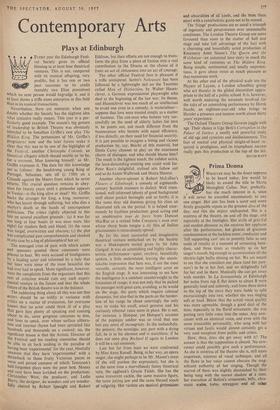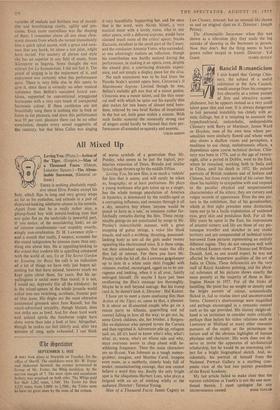Prima Donna
WHOEVER may be the finest soprano to be heard today, few would be likely to award the title to Maria 0110:1., Meneghini Callas. Nor, probably, , '1%6" has she much interest in it, since it will never be awarded unanimously to any one singer. Her aim has been a surer and more firmly graspable repute as the greatest diva of the day, and this she enjoys undisputed. She is a mistress of the theatre, on and off the stage, and especially at the footlights. Her smile of grateful and modest pleasure as she receives her applause after the performance, her glances of gracious condescension at the luckless tenor, conductor and 'full supporting cast' are as patently false as any smile of royalty at a moment of screaming bore- dom, and three times as readably so on her singer's mouth, big enough to accommodate all the electric-light bulbs shining on her. We are meant to see that she considers our place (and her part- ners') to be at her feet, and we delightedly fall for her and lie there. Musically she can get away with murder. In La Sonnambula at Edinburgh her notes from top E flat down to about B were generally loud and unlovely, and from there down to the top of the stave they were liable to split excruciatingly into two, whether she was singing soft or loud. Below that the actual vocal quality was more agreeable, though a good deal of the time, especially in the florid ornaments, she was putting very little voice into the notes. Any new- comer with an identical voice, and even with the same irresistible personality, who sang with her virtues and faults would almost certainly get a very cool reception from public and critics.
How, then, does she get away with it? The answer is that the supposition is absurd. No new- comer could possibly give such a performance. As she is mistress of the theatre she is, still more important, mistress of vocal technique, and all the flaws in her voice cannot obscure the mag- nificent authority of her singing. Though the marvel of them was slightly diminished by their being sung with the merest shadow of a tone, her execution of Bellini's ornaments, trills, chro- matic scales, turns, arpeggios and all other varieties of roulade and fioritura was of incred- ible and breathtaking clarity, agility and pre- cision. Even more marvellous was the shaping .of them. I remember above all one steep chro- matic descent from which she turned immediately into a quick spiral ascent, with a grace and sure- ness that any hawk, let alone a test pilot, might have envied. For mastery of phrase and style she has no superior in any field of music, from Klemperer to Segovia. Some thought she was miscast for La Sonnambula. I did not feel it. The proof of singing is in the enjoyment of it, and enjoyment was certainly what this performance gave. There is very little else in this opera to give it, since there is virtually no other musical substance than Bellini's sustained lyrical can- tilena, supported by conventional arpeggiated harmonies with a very rare touch of unexpected harmonic colour. If these cantilenas are not beautifully sung there is nothing else to look or listen to for pleasure, and since this performance was 95 per cent. pleasure there can be no other conclusion, despite every sound suggestive of the contrary, but that Mme Callas was singing it very beautifully. Supporting her, and for once that is the word, were Nicola Monti, a very musical tenor with a lovely voice, who in any other opera, with a different soprano, would have claimed much more of the critics' space; Nicola Zaccaria, excellent in the small part of the Count; and the conductor Antonio Votto, who succeeded, as one admiringly realises on reflection, though his contribution was hardly noticed during the performance, in making it an opera, even, despite the absurd plot, a convincing dramatic experi- ence, and not simply a display piece for the diva.
No such enjoyment was to be had from the Piccola Scala's second opera here, Cimarosa's II Matrimonio Segreto. Limited though he was, Bellini's melodic gift was that of a minor genius. Cimarosa was a minor talent, and the thin musi- cal stuff with which he spins out his equally thin plot makes for two hours of almost total bore- dom, relieved by two brief flashes of inspiration in the last act, both gone within a minute. With such feeble material the nominally strong cast of singers could hardly be blamed that their per- formances all sounded so squeaky and anemic.
COLIN MASON































 Previous page
Previous page